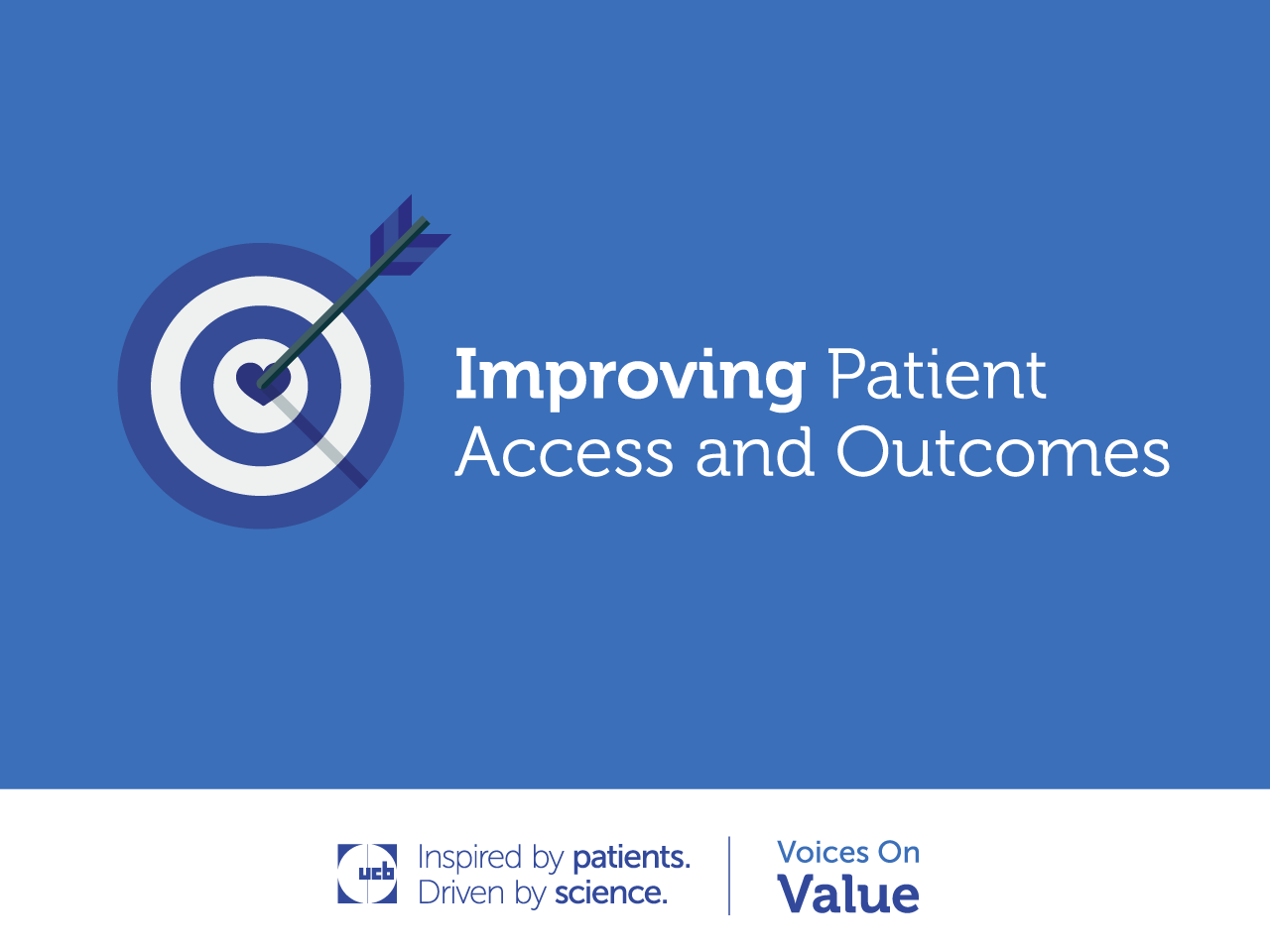
The pharmaceutical industry is driven to discover solutions. We face the difficult questions around health head on, with the belief that we can identify, treat, and potentially cure disease. At UCB, we are committed to delivering solutions for high-value care to patients living with severe neurological and immunological conditions. This includes our overarching commitment to the Triple Aim[1], which for UCB includes prioritizing innovative approaches to commercial and government payer contracting to support the delivery of value-based care.
As our health care system shifts from volume- to value-based reimbursement, industry participation in value-based contracts (VBCs) is helping drive this transformation. VBCs improve payer affordability, and thus patient access, by linking what payers pay for our medicines with the outcomes our products deliver to patients, as measured by a range of performance indicators.
[1] http://www.ihi.org/Engage/Initiatives/TripleAim/Pages/default.aspx
Our Approach to VBCs
To harness the potential of VBCs, UCB proposes value-based approaches to payers based on the clinical attributes of our products. We then partner with payers to develop a VBC using real-world evidence (RWE), clinical trial data and our deep understanding of patient and payer needs. This approach is paramount in guiding which products and which arrangement will deliver results for patients and the system. VBCs also strengthen UCB’s already competitive payer contracting strategy.
UCB supports optimal access to our medicines across a broad range of health plans through a unique VBC approach, which includes:
- Partnering with payers on VBCs that ensure our product cost is based on the performance of our products and is adjusted over time to reflect efficacy and that patients are offered the lowest branded co-pay for this product;
- Engaging in a first-of-its-kind program to actively outreach to patients after their first treatment and provide continuous support when people face barriers adhering to their treatment regimens, as adhering to necessary medications is key to high-value care;
- Supporting value across our established products, not just new medicines, for patients with chronic inflammatory and neurological conditions[1]; and
- Working closely not just with commercial payers, but also proactively pursuing contracts with state Medicaid programs to ensure states and patients share in lower cost benefit options.[2]
UCB’s digital business transformation has also enabled us to optimize VBCs through enhanced RWE generation. Last fall, UCB announced a partnership with Aetion, a leader in RWE analytics, allowing UCB to rapidly respond to payer questions around the effectiveness and value of our products. Through this partnership, UCB has reduced the time it takes to respond to payer queries from 3-4 months to 2-3 weeks. This reduction has enabled us to assess patient needs faster and understand, in almost real time, the value our medicines deliver to patients and payers engaged in VBCs with UCB.
Paving the Way Toward Widespread Adoption of VBCs
While VBCs have tremendous potential to ensure the system is paying for high-quality care, existing policy and regulatory requirements are creating barriers to maximizing this transformation. As a strong supporter of value-based care, UCB is advocating for modest changes to pave the way toward widespread adoption, including:
- Realigning Medicaid Best Price calculations to promote, not penalize, VBCs;
- Streamlining the Medicaid VBC process by granting state programs standing authority to negotiate and enter into VBCs with manufacturers; and
- Enabling manufacturers to assist Medicaid programs by engaging with third parties to provide data analysis.
VBCs are positioned to improve patient access and outcomes, all while reducing health care spending and decreasing payer risk. VBCs also can serve as a catalyst for innovative contracting via RWE-driven decision-making. As we look forward, UCB continues to innovate the VBC landscape by:
- Co-creating our VBCs with the intention to share our outcomes with regulators, future VBC payer partners or the public, a practice that is currently not standard;
- Structuring reimbursement so that patients and employers benefit from VBC contracts;
- Looking at the value of our entire portfolio to payers, not just individual products, when considering outcomes-based reimbursement; and
- Continuing to advance conversations with policymakers and regulators to minimize, and eventually remove, barriers to widespread use of these innovative contracting models.
While we recognize that VBCs may not always come to fruition for a variety of reasons, we are not shying away from the hard work of exploring and transforming VBCs for the future. At UCB, we believe innovation doesn’t just happen at the lab bench, it can happen in the board room, too. And our focus on contracting strategies that keep up with the pace of the real world is proof of our ultimate commitment to improving patients’ lives.
[1] https://www.highmark.com/newsroom/press-releases/highmark-forges-outcomes-based-contract-with-ucb-for-anti-inflammatory-drug-cimzia.html
[2] https://www.unitedhealthgroup.com/content/dam/UHG/PDF/2021/Medicaid-Best-Price-VBA-Case-Study.pdf
Choose Country
- Global Site – English
- Australia – English
- België – Engels
- Belgique – Anglais
- Brasil – Português
- България – Български
- Canada – English
- Canada – Français
- 中国 – 中文
- Česká Republika – Angličtina
- Danmark – Engelsk
- Deutschland – Deutsch
- France – Français
- España – Español
- Ελλάδα – Ελληνικά
- India – English
- Ireland – English
- Italia – Inglese
- 日本 – 日本語
- Казахстан – ағылшын тілі
- 한국 – 한국어
- Luxembourg – Anglais
- Luxemburg – Engels
- Magyarország – Angol
- México & Latinoamérica – Español
- Nederland – Engels
- New Zeeland – English
- Norge – Engelsk
- Österreich – Deutsch
- Polska – Polski
- Portugal – Inglês
- România – Engleză
- Россия – Русский
- Slovensko – Anglický
- Suomi – Englanti
- Sverige – Engelska
- Schweiz – Deutsch
- Suisse – Français
- Türkiye – Türkçe
- Україна – Англійська
- United Kingdom – English
- U.S.A. – English


